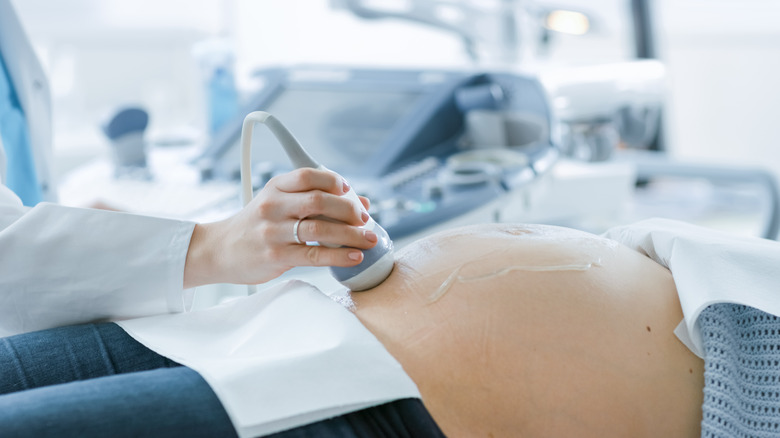How To Manage An Ovarian Cyst While Pregnant
Dealing with an ovarian cyst, especially if it bursts, is bothersome at best. At their worst, they can cause symptoms like pelvic pain, bloating, or a feeling of fullness in your abdomen. But what happens if you experience an ovarian cyst while pregnant?
An ovarian cyst is a fluid-filled sac that can occur within or on an ovary, per the Mayo Clinic, and there are two main types. Each month, a follicle in an ovary will release an egg, which may or may not lead to pregnancy. After releasing the egg, the follicle closes up and releases hormones necessary for conception. But sometimes, the follicle doesn't release an egg at all, which causes a follicular cyst in its place.
If the follicle does release an egg, it then becomes the corpus luteum, which is where the hormones for pregnancy are released from. This opening can sometimes become blocked after the egg releases, which leads to a corpus luteum cyst. These two types of cysts are known as functional cysts. They are often painless and go away on their own within a few cycles, but if they become large and burst, they can cause severe pain and bleeding.
What happens if you have ovarian cysts during pregnancy?
It is possible either to develop an ovarian cyst during the early weeks of pregnancy — a corpus luteum cyst can form at this time — or to become pregnant when you already have a cyst (per What to Expect). This is very common, and the cyst will most likely still go away on its own, typically before the second trimester. Some can continue growing during the pregnancy, but usually won't impact it. However, you may experience symptoms associated with a cyst, like pain and abdominal pressure.
If you have ovarian cysts during pregnancy, your doctor may want to monitor them with regular ultrasounds. This will allow your doctor to track the cysts and make sure they aren't growing or changing. If a cyst bursts during pregnancy, your doctor may prescribe pain medication and tell you to focus on getting lots of rest. In some cases, surgery may be necessary, especially if you're experiencing lots of bleeding, risk of infection, or the ovary is twisting, also known as ovarian torsion. If you're having abdominal pain that comes with fever, heavy bleeding, severe nausea or vomiting, or dizziness, contact your healthcare provider right away (via Johns Hopkins Medicine).


